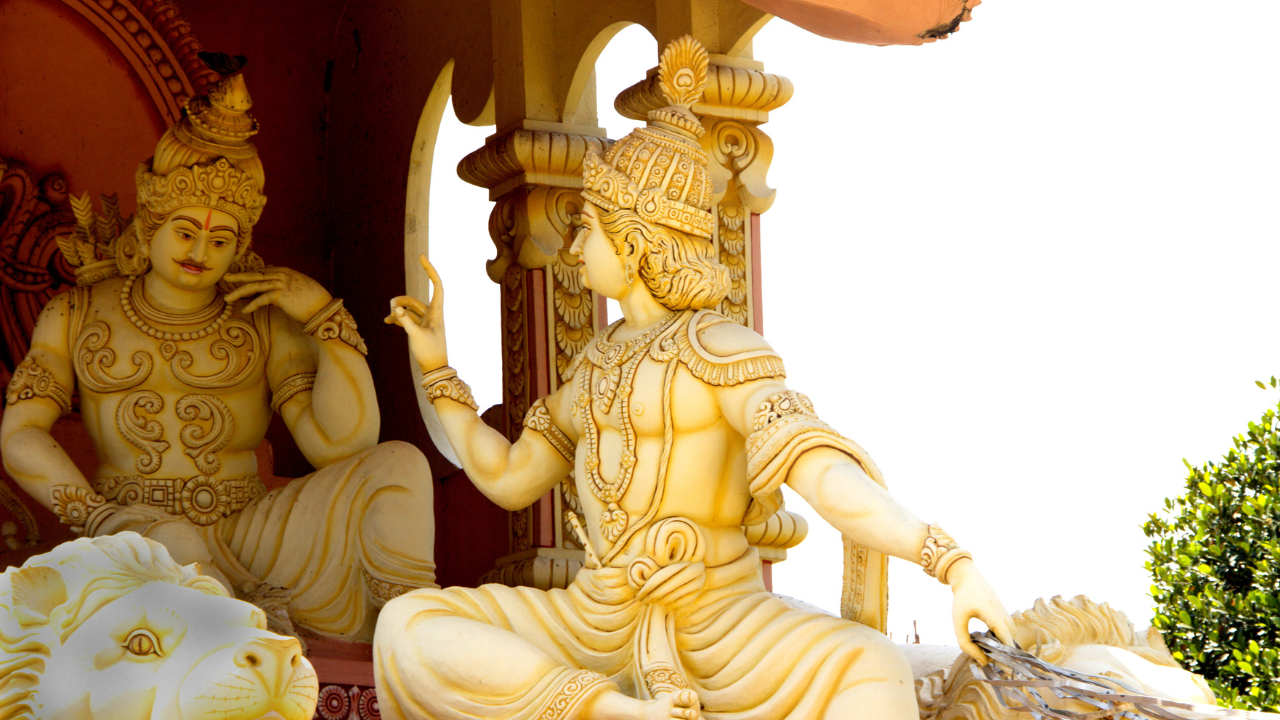
1/6
Bhagavad Gita's timeless wisdom for modern relationships
The Bhagavad Gita is a sacred Hindu text that teaches one how to live life through self-awareness, detachment, and doing one's duty. Spread in 18 chapters and 700 verses, this is one of the most important texts in Hinduism, and an inspiration for many devotees across the world. In the Mahabharata, when Arjun was going through an inner turmoil right before the great war of Kurushetra, it was Shri Krishna who helped him navigate the challenges by imparting knowledge and wisdom. Similarly, through the Bhagavad Gita, Shri Krishna helps one navigate the challenges of life and sail through with faith and devotion. The Bhagavad Gita, when applied to everyday challenges and relationships, can also guide one to navigate the ups and downs of a marriage and lead a happier life. So, here we list some important tips from the Bhagavad Gita that can improve your marriage and lead to better partnership in life:

2/6
Practice selfless love (Chapter 3, Verse 19)
The Gita teaches one to perform nishkama karma— which means acting without selfish desires. In marriage, this translates to loving and supporting your partner unconditionally. Often, relationships falter due to a “what am I getting” mindset. However, Shri Krishna advises one to focus on performing their duties with sincerity, and not expecting any rewards in return. When this is applied to relationships and marriages, it frees one from expectations from their partner and leads a happier connection. When both partners give without keeping score, their bond deepens naturally.

3/6
Control your mind and emotions (Chapter 6, Verse 5)
Krishna says, “Let a man lift himself by himself… for the self alone is the friend and the enemy of the self.” Marriage often tests one's patience and emotional regulation. If you can’t control your anger or frustration, even small issues can become big problems. And so, the Bhagavad Gita urges one to master and train their mind through introspection, mindfulness, and spiritual discipline. When disagreements arise, pause before reacting. Use calm words. Reflect instead of retaliating. Controlling your emotions doesn’t mean suppressing them; it means expressing them with care and awareness, so your partner feels heard, not hurt.

4/6
Let go of ego (Chapter 2, Verse 70)
One of the biggest barriers in marriage is ego— the need to always be right, to win arguments, or to dominate emotionally. However, the Bhagavad Gita teaches one to let go of ego, be detached, and stay balanced. When you let go of pride and embrace humility, you can apologise sincerely, forgive freely, and avoid power struggles with your partner.

5/6
See the divine in your partner (Chapter 6, Verse 30)
The Bhagavad Gita encourages us to see the divine in every being- this mindset helps one to be more kind, empathetic and loving towards others. In marriage, this means truly valuing your partner and considering them as a divine soul on their own spiritual journey. When you look beyond flaws and ego, and appreciate their very essence, your love becomes deeper and more accepting. This mindset can profoundly improve your relationship with your spouse.

6/6
Perform your dharma (duty) as a spouse (Chapter 18, Verse 47)
Chapters 1 to 6 in the Bhagavad Gita teaches one about Karma Yoga-- that performing one’s swadharma (personal duty) is better than imitating others. When applied to marriages, this means one should embrace their role as a spouse with responsibility and care, and perform their duty (dharma) as a partner wholeheartedly. Whether it’s being emotionally supportive, sharing household duties, or simply being present— fulfilling your duty as a spouse helps strengthen your relationship with your partner. Don’t compare your marriage to others or follow trends (read couple goals on social media) blindly. Focus on what your marriage needs, and be consistent in your effort.
Follow Us On Social Media

 2 days ago
48
2 days ago
48




























 English (US)
English (US)